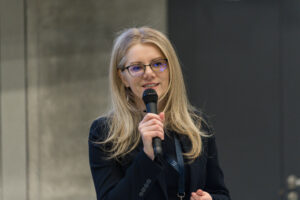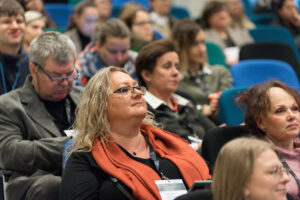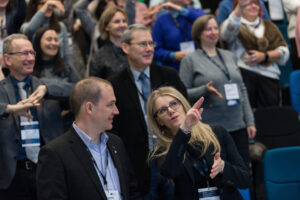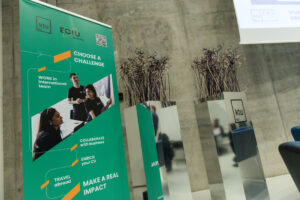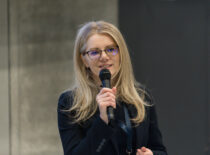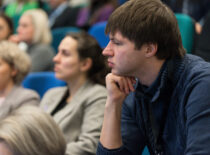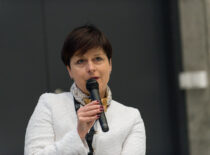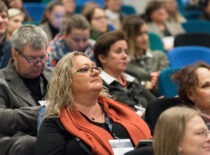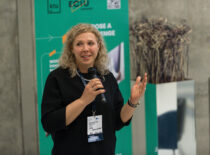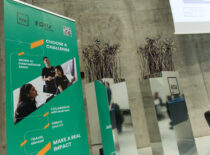Lindsay, who gave a presentation at the Study Quality Day, an annual event organised by KTU, says that one of the changes that universities need to introduce to adapt to the modern market is the unbundling of study programmes. That is, the study programmes should be designed with the outcome in mind – what do we want our graduates to be able to do after they graduate?
“When we look at cathedrals, we don’t think about the individual bricks that were used to build them. So, if we want our students to learn how to build cathedrals, we need to think about the competencies they need. How we teach them thermodynamics or mathematics, how we test their knowledge – these are just details,” says Lindsay.
What is the added value of university studies?
Today’s learners come from different walks of life. Among them are those who have previous work experience, those returning to higher education after a break from studies, and those pursuing new career goals that require further education.
According to the World Economic Forum’s Future Jobs Report, 44% of workers will need to update their skills portfolio by 2027 as technology is evolving at an extremely fast pace. However, cognitive and personal skills such as analytical, creative, systemic thinking, curiosity, resilience and agility are among those that will be particularly in demand.
According to the KTU Vice-Rector for Studies Ukvalbergienė, the university offers a comprehensive environment for intensive learning and, in addition to the skills required for the specialisation, the ability to work in interdisciplinary, international teams, collaborate, think strategically, manage time, and other skills are being developed. The University is a place where information is concentrated and easily accessible, where experimentation in various laboratories is possible, and where knowledge is conveyed by teachers who have the experience and skills to develop the competencies of the learners.
However, from her point of view, the university is not the only actor in the education system. Some reskilling or upskilling programmes require high speed or very narrow specialisation and this niche can be filled by other organisations.
“A university is part of an ecosystem. Working together with the city, the region, and business, we share a common goal – to educate responsible and value-added members of society. All these aspects add value to university education,” says Ukvalbergienė.
The future university is akin to a travel agency
The need for a qualification or a degree can arise at any stage of your career. For example, qualifications may be needed to apply for a promotion or a licence, and there is evidence suggesting that higher education is associated with higher income. However, people who are already working have knowledge and skills and may feel that they have a good understanding of some subjects in their studies despite lacking a degree certificate which proves that.
“I remember one student who took long drives to get to campus to do compulsory laboratory classes on a piece of surveying equipment. He was really surly and when I asked what’s the problem, he said repairing this equipment was his day job,” says Lindsay.
He believes that universities need flexibility in similar situations. Lindsay jokingly compares universities of the future to travel agencies: if you want to travel, you can book your own plane tickets, hotel and leisure programme. But you can also ask a travel agent to do the same – they can take care of the whole trip or just certain aspects of it as required.
“Universities that are better suited to the current situation are those that say: if you start your studies already knowing half of it, we won’t teach you that. Instead, we’ll certify it and teach you the rest,” says Lindsay.
Ukvalbergienė, KTU Vice-Rector for Education, says that KTU has been applying recognition of competencies acquired via non-formal and informal learning for more than a decade.
“For example, if you think you have a certain competence, say in project management, the university can test your skills and formally recognise it. Formally recognised competencies can be certified as outcomes of a university study programme or a module, which do not require retaking,” explains Ukvalbergienė.
Today’s graduates will remain in the job market for the next 50 years
Lifelong learning is gaining momentum, not only because it is being promoted by various national and international programmes, but also because society is demanding it. The world is changing, people are living longer, technology is advancing faster and the need to update knowledge is becoming essential.
“Today’s university graduates may live up to 90 or 100; it is likely that they will be working by the time they reach 70. Do you think they won’t need to update their knowledge in the next 50 years? I certainly wouldn’t want to base my current practice on what I would have learnt in the 1970s,” says Lindsay.
Lindsay and Ukvalbergienė, who have been teaching for about 20 years, agree that students today care about the purpose of what they’re learning much more than before.
“I used to think that current students were interested in changing the world, but I changed my mind on that. I think they are more interested in changing the world around them. This is a very different kind of leadership: not the noisy setting of grandiose goals, but the pursuit of individual change for the city, for the community,” says Lindsay.


